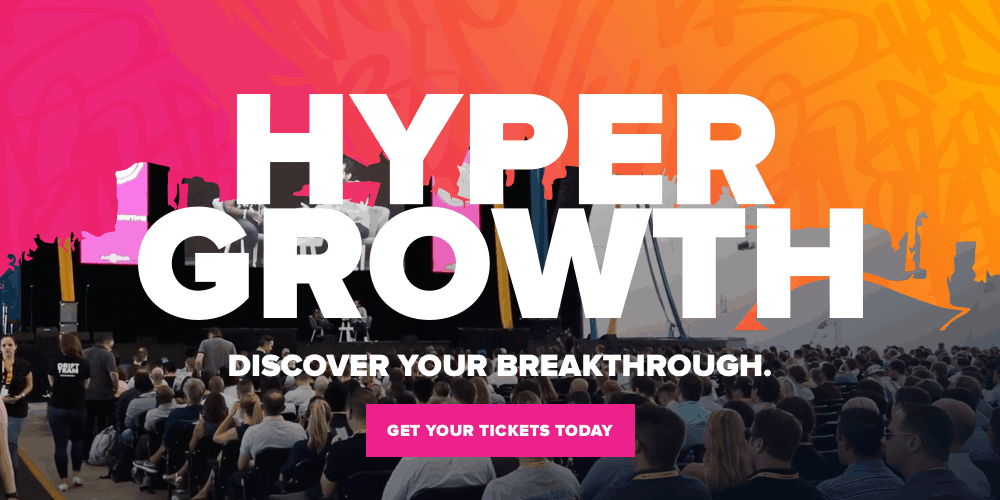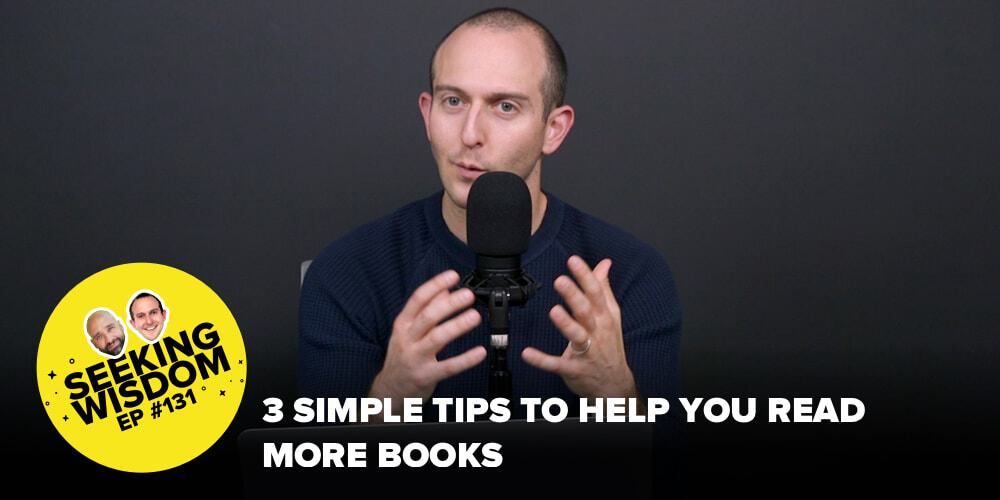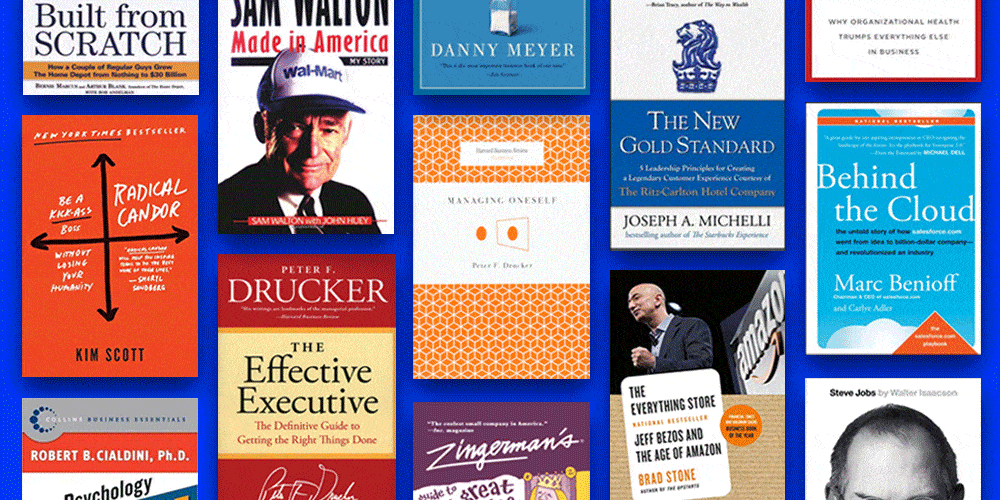Editor’s Note: The following is based on Steli Efti’s HYPERGROWTH 2018 presentation. Ready for HYPERGROWTH 2019? You can pre-order tickets here.
There’s no way around it: If you want to unlock the next level in your career growth, you need to read – and not just the sports or style section. You need to read actual books.
☝️ That might be the single biggest takeaway from Close.io CEO Steli Efti’s HYPERGROWTH 2018 presentation: “How Reading Books Saved My Life.”
During the presentation, Steli talked about how, as a kid and teenager, he never paid attention in school, and how he hung out in a social circle that didn’t put much value on getting a traditional education. But instead of traveling down a path he might later come to regret, Steli, at age 16, decided he would educate himself on his own terms. So, he walked into a bookstore…
It took me a lot of courage to go in. I walked in there, no eye contact, just trying to find the corner with the books about business or stocks, and I picked up the cheapest book that they had about stocks for $9.99… I was so passionate about this secret knowledge that I just acquired reading a book for $9.99 about stocks. Everything changed in that moment. Everything. I was so excited. I was like, I need to know more.
So I went back to the bookstore and bought another book, and then I went back and I bought another book, and I started to fall deeply in love with reading and books. And, slowly but surely there was a disconnection between my experience in school and how much I love to learn.
One of the most beautiful things about books, Steli soon realized, was that while the environment he grew up in was negative, the books he was reading were positive, and their authors showed him career paths and exposed him to ideas that he might otherwise have completely ignored. These authors, in turn, ended up serving as Steli’s role models, at a time when he didn’t have many. As Steli explained in his talk:
So I was reading these books and they were pretty positive, and these books were written by people that were completely beyond the reach of my social circles. And I imagined, with every book I was reading, I always imagined them being my friends. Imagined them being in the room telling me these stories, coaching me, mentoring me, right?
All these people that shared their story, their wisdom, their learnings with me. I created emotional relationships with them while reading these books. I didn’t just read information, or scan for information, I had experiences with them.
For Steli, reading books wasn’t just a fun pastime, it was crucial to helping him get out of a rough situation. And it was crucial to helping him grow, both personally and professionally.
And it all started with that one, $9.99 book on stocks.
But look, I get it:
Not everybody likes to read. Take Drift VP of Marketing Dave Gerhardt, for example, who confessed that before joining Drift, he had read approximately ten books in his entire life.
What many people don’t realize is that even if you don’t particularly like reading, you can train yourself to be a better reader so that you end up getting more out of the experience. (Case in point: reading has now become part of Dave’s daily routine, and he’s reading something like 50+ books per year. It’s completely changed how he learns as well as how he works.)
At HYPERGROWTH 2018, Steli shared four best practices that can help you – whether you like reading or not – squeeze more knowledge out of every book you pick up.
In a hurry? Here’s the tl;dr version:
- Don’t force yourself to finish an entire book. If you’ve already learned one big thing from it, don’t feel obligated to read all the way to the end.
- Don’t stop reading because you disagree with something. Exposing yourself to a diverse array of ideas and opinions is essential for growth.
- Keep your ego out of it. Remember that reading isn’t a competition: the goal is self-betterment, not reading more books than someone else.
- Re-read books you felt strongly about. Whether you loved them or hated them, read them again and see if you missed anything the first time.
1) Don’t force yourself to finish an entire book.
During his presentation, Steli argued that one of the worst habits people can develop when it comes to reading is “having this inner need” to “read books from A to Z. From cover to cover and go sequentially.” Because the reality is, even if you don’t finish 100% of a book, you can learn a lot from it. As Steli explained:
I’ve met people where I’m like, “Have you read this book?” And they are like, “No.” And then when I talked to them about it, I realized they read 85% of the book, but they couldn’t finish it. So in their mind, they haven’t read anything…
Maybe it’s because school teaches us to read things and finish things, you start and finish tasks. So the way you’ve learned to read, it’s probably something that happened really early in your life. You have reading habits. I would ask you to examine those. What feels good and what feels bad when reading? Are you a person that always has to finish the book or you feel terrible? So you force yourself to read through terrible books, and you just punish yourself through the pain of finishing it and even though you’re not getting anything out of it.
The secret here is to prioritize your own learning. If a book has already given you a new idea to chew on, but the rest of it is a slog and you’re not learning anything new, don’t feel bad about putting it down. You’d be better off starting a new book. As long as you’re able to take away one idea from whatever it is you’re reading, you’re succeeding. To quote Steli:
You could read a book, just one chapter of it, and you’ve read the book. Not all of it, but you’ve read something. You just need to take one idea… you don’t have to finish a book.
2) Don’t stop reading because you disagree with something.
Another bad habit Steli has observed over the years is the tendency for people to stop reading a book when they encounter an opinion or viewpoint they disagree with. As Steli explained in his presentation:
Stopping in chapter one because there was one thing you didn’t agree with, really? That’s a very limiting way of approaching ideas, and sharing, and learning…
How many people do you know who, while you don’t agree with everything they think in life, you still learn from? Right?
The underlying issue here is that when you refuse to read and consider a diverse set of opinions and ideas, you’re limiting your own learning and succumbing to confirmation bias. If you’re picking and choosing and only reading books that reaffirm and fortify the opinions you’ve already developed, that’s only going to hinder your growth in the long run.
3) Keep your ego out of it.
Steli admits that when he first got into reading, he enjoyed the ego boost he felt after buying and reading a vast quantity of books. As he explained in his presentation:
For a while I became so in love with reading books that reading became a sport. I was like, I want to have this massive library. I want to build a building that’s a library of all my books.
However, the more he read and the more he learned, the more Steli came to see that treating reading as a game wasn’t the point. It wasn’t about comparing spreadsheets and amassing giant collections. It wasn’t about bragging about how many hundreds, or thousands, of books you’ve read. In the end, he realized that the quality of what you’re learning is more important than the quantity of books you’re reading. To quote Steli:
People are like, “I read one book a month this year. Twelve books, boom!” And then the other person’s like, “Well, I read a book a week this year.” And the next one’s like, “I’m reading a book a minute.” And it’s like people are comparing who has the biggest library of books.
It’s so dumb. There’s not a quantity play, right? If you read a hundred more books than me that doesn’t mean you’ve learned more, or that you’re better, or smarter, or anything like that. Right? It’s not a sport.
If you just read to get through the book as quickly as possible to get to the next book as quickly as possible… you’re not going to be present to enjoy anything, to learn anything, to be part of anything.
4) Re-read books you felt strongly about.
This probably won’t come as a big surprise, but people ask Steli for book recommendations all the time. One of his favorite answers that he gives in reply to this question:
Go back and reread a book that you’ve already read – one that you either really liked, or really hated. To quote Steli:
What I want you to do is think about a book that was really amazing that you’ve read and it’s been longer than five years. I want you to put that on your reading list and re-approach that book. And I want you to think about a book that you tried to read longer than five years ago that you really hated. Note if there is something you forgot, something that you remember. Just give it another try.
You might have the same experiences, but you might have completely different experiences because as you, your life, and the context of your life change, so do the books that you read. So do the things that you pick up from those books.
Here’s another pro tip: You shouldn’t stop at re-reading a book just once. According to Steli, you should keep going back to the well over and over and re-reading your favorites (and least favorites) with fresh eyes. As Steli explained:
There are books that I’ve read 11 times and the 11th time I could swear they printed a new chapter and brought it to my home when I was sleeping and put it in there. I’m like, there’s no way this was here. I read this book so many times. It’s impossible that it was in the book before.
The truth is you are changing, and so is your reading experience.
—
Looking for more expert insights for achieving personal and professional growth?
It’s year three of HYPERGROWTH and we’re bringing it to not one, not two, but THREE cities! You can purchase early bird (hint: discounted) tickets for HYPERGROWTH in London now with tickets for Boston and San Francisco coming soon here.







